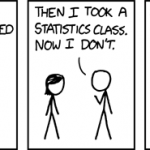neuroscience
class="mt-enclosure mt-enclosure-image" style="display: inline;">
href="http://xkcd.com/552/">
(comic from
href="http://xkcd.com/552/">kxcd)
href="http://www.researchblogging.org">
alt="ResearchBlogging.org"
src="http://www.researchblogging.org/public/citation_icons/rb2_large_gray.png"
style="border: 0pt none ;">
This post
will discuss some findings about the factors that
are correlated to clinical response to
href="http://en.wikipedia.org/wiki/Clozapine">clozapine
(Clozaril® , FazaClo® ).
Clozapine is a drug used to treat psychosis. It usually is…
Brevity can be a creative coup. Consider Claire Evans' "Evolution of Life in 60 Seconds", which shoehorns our entire history into one minute: as the clock slowly ticks away, it makes me fear for a moment - implausible as it may seem - that it might run out before we evolve. Then there's the genius of Hamlet as Facebook updates (or Pride and Prejudice, though I don't find it nearly as good as Hamlet.) Maybe it's a symptom of our increasingly short attention spans, the acceleration of the news cycle, or simply the accumulation of too darn much data; for whatever reason, brevity is trendy. And…
Ezra Klein reviews Obama's handling of yesterday's health summit -- a piece well worth reading for a taste of how sharply focused and serious Obama is about truly comprehensive health-care reform.
Karen Tumlty, a health-care expert, describes in Time her own family's grueling wrestling match with the health-insurance industry. A timely story -- no pun intended -- as it makes painfully clear that it's not just the 46 million people uninsured (did I just say "just" 46 million people) who fare poorly in the current system.
Genetic Future looks at how a Victorian-era height-prediction system…
Neural Markers of Religious Conviction:
Many people derive peace of mind and purpose in life from their belief in God. For others, however, religion provides unsatisfying answers. Are there brain differences between believers and nonbelievers? Here we show that religious conviction is marked by reduced reactivity in the anterior cingulate cortex (ACC), a cortical system that is involved in the experience of anxiety and is important for self-regulation. In two studies, we recorded electroencephalographic neural reactivity in the ACC as participants completed a Stroop task. Results showed that…
I forgot! But they say it was in a movie.
Mo explores the portrayal of Amnesia in the movies. Lovely!
From SCONC:
Thursday, March 5
7 p.m.
What Good is it to Feel Good? The Science of Positive Emotions
From our "what the world needs now" file, Dr. Barbara Frederickson, head of the Positive Emotions and Psychophysiology Lab at UNC will share thoughts from her new book, Positivity. You can strengthen relationships, relax the mind and relieve stress by thinking positively. Part of the Current Science Forum at Morehead Planetarium, UNC.
I drove up to Montreal yesterday, and amid visits with anthropologist and Somatosphere founder Eugene Raikhel, anthropologist Allan Young, and Suparna Choudhury, talked about (among other things) the emerging new area of study they're calling "critical neuroscience."
What the heck is critical neuroscience? Well, one definition calls it
the attempt to assess and inform neuroscientific practice from a rich interdisciplinary perspective, and to categorize, evaluate and (begin to) manage the various risks resulting from neuroscience and its results and applications
.
Daniel Lende, one of the…
Alzheimer's disease is the most common form of dementia in the world, affecting more than 26 million people. Creutzfeld-Jacob disease (CJD), another affliction is far less common, but both conditions share many of the same qualities. They are fatal within a few years of diagnosis, they are incurable and they involved the crippling degeneration of the brain's neurons. Now, a group of Yale researchers have discovered that the two diseases are also linked by a pair of critical proteins.
Look into the brain of someone with Alzheimer's disease and you will see large, insoluble "plaques" sitting…
Originally posted by Seth Herd at Developing Intelligence
On February 24, 2009, at 12:00 PM
I disagree with many of Gary Marcus's theories, but I think that his book Kluge is important, entertaining, and even accurate. The book's main thesis is that if God had designed the human mind, He would've done a better job. I'm not all that interested in arguments about intelligent design, but Kluge also has a lot to say about the human brain/mind and even the human condition.
I've frequently baffled and offended my students by saying "people are stupid!" Kluge is about how, exactly, we are…
Alzheimer's Disease is the most common form of dementia, affecting more than 400,000 people in the U.K. and some 5.5 million in the U.S. The disease has a characteristic pathology, which often appears first in the hippocampus, and then spreads to other regions of the brain. This is accompanied by impairments in cognition, with cell death and loss of connections leading first to deficits in memory and spatial navigation, and then to global dysfunction.
The exact cause of Alzheimer's is not known, but a number genes have been implicated. One of these encodes a protein called amyloid…
Seed Magazine has a nice review of the brewing controversy over shoddy statistical methods in the field of fMRI. To some extent science is politics, this is a sexy and appealing field. A friend of mine who is a psychologist mentioned that though he doesn't think much of fMRI the head of his lab group wanted to make sure that there was always some neural imaging in their papers to increase the likelihood of acceptance. A few vivid images is worth a lot of turgid prose; even if some of the criticisms of fMRI are overblown I suspect that it was necessary that the field be brought down a few…
Welcome 4 March readers of The Daily Grail - please be sure to also click on the original post about the DMT article by my colleague, Laura Mariani.
Thanks to Dave Munger & Co's ResearchBlogging.org, I just found a fabulous neuroscience grad student blogger from Emory University: Laura E Mariani at Neurotypical?
Doctor-to-be Mariani blogged last Monday about a paper in Science where the endogenous ligand of the orphan sigma-1 receptor was identified as the hallucinogen, N,N'-dimethyltryptamine, or DMT. The work originated with the group of Arnold Ruoho and colleagues at the University…
The trauma of child abuse can last a lifetime, leading to a higher risk of anxiety, depression and suicide further down the line. This link seems obvious, but a group of Canadian scientists have found that it has a genetic basis.
By studying the brains of suicide victims, Patrick McGowan from the Douglas Mental Health University Institute, found that child abuse modifies a gene called NR3C1 that affects a person's ability to deal with stress. The changes it wrought were "epigenetic", meaning that the gene's DNA sequence wasn't altered but it's structure was modified to make it less active.…
Essays are like cupcakes: they're tasty, abundant, idiosyncratic, and small enough to finish without feeling you've overindulged - which leaves you vulnerable to the self-deception that just one more is a good idea. So here are some weekend reading suggestions for a lazy Sunday.
--At SEED, Carl Zimmer's love letter to natural history museums as functional wonder cabinets:
Gradually, royalty's cabinets of wonders turned into libraries of flesh and rock, where scholars could research the workings of the world. Ole Worm, a 17th-century anatomist, became famous for his collection of narwhal…
Working memory refers to the process by which small amounts of information relevant to the task at hand are retained for short periods of time. For example, before cellular phones became so ubiquitous, calling someone usually involved first finding the number and then remembering it for a just few seconds by repeating it to oneself several times. Once the digits had been dialled, they are immediately forgotten.
Very little is known about the neural mechanisms underlying working memory, but very recently some advances have been made. Last month, a group from the University of Texas Medical…
For my DC peeps: I've been helping one of my colleagues with an event for college journalists, to be held next Friday at NIH (Bethesda, MD). It's a roundtable discussion on the challenges of covering addiction issues; scheduled guests include Lisa Stark of ABC News, Lauran Neergaard from the AP, and Jacqueline Duda of the WaPo, as well as scientists from NIH, NIDA, the University of Maryland and the University of Michigan. The event is free and open to college students at regional institutions of higher learning.
There is still some space left, so if you know any DC-area college students who…
The wiping of unwanted memories is a common staple of science-fiction and if you believe this weekend's headlines, you might think that the prospect has just become a reality. The Press Association said that a "drug helps erase fearful memories", while the ever-hyperbolic Daily Mail talked about a "pill to erase bad memories". The comparisons to The Eternal Sunshine of the Spotless Mind were inevitable, but the actual study, while fascinating and important, isn't quite the mind-wiper these headlines might have you believe.
The drug in question is propranolol, commonly used to treat high…
A sixth of a GCSE in 60 minutes?:
Later this year, pupils from Monkseaton high school will file into their new lozenge-shaped school and take their seats before a giant video wall in a multipurpose hall. Here, they will receive a unique lesson: an intense PowerPoint presentation, repeated three times, and interspersed with 10-minute breaks of juggling or spinning plates. After one hour of this study, the pupils will be primed for one sixth of a GCSE. In theory, following this "spaced learning" method, a teenager could sit a GCSE after just three days' work.
It is a vision of the future that…
Yesterday I prepared to write my Darwin Day post by attending a panel discussion at the Center For American Progress here in DC. The discussion was ostensibly about "evolution, transcendence, and the nature of faith," which led my friend Colin and I to hope for a spirited debate - perhaps even a die-hard creationist who would speak for the three-quarters of frequent churchgoers who don't accept evolutionary theory! But what we got was a predictable, rather boring discussion - at least until David Sloan Wilson arrived and threw me for a loop.
The first two panelists were Rev. Dr. Susan Brooks…
Most of us have experienced the vague feeling of knowing something without having any memory of learning it. This phenomenon is commonly known as a "gut feeling" or "intuition"; more accurately though, it is described as implicit or unconscious recognition memory, to reflect the fact that it arises from information that was not attended to, but which is processed, and can subsequently be retrieved, without ever entering into conscious awareness.
According to a new study, our gut feelings can enhance the retrieval of explicitly encoded memories - those memories which we encode actively - and…

